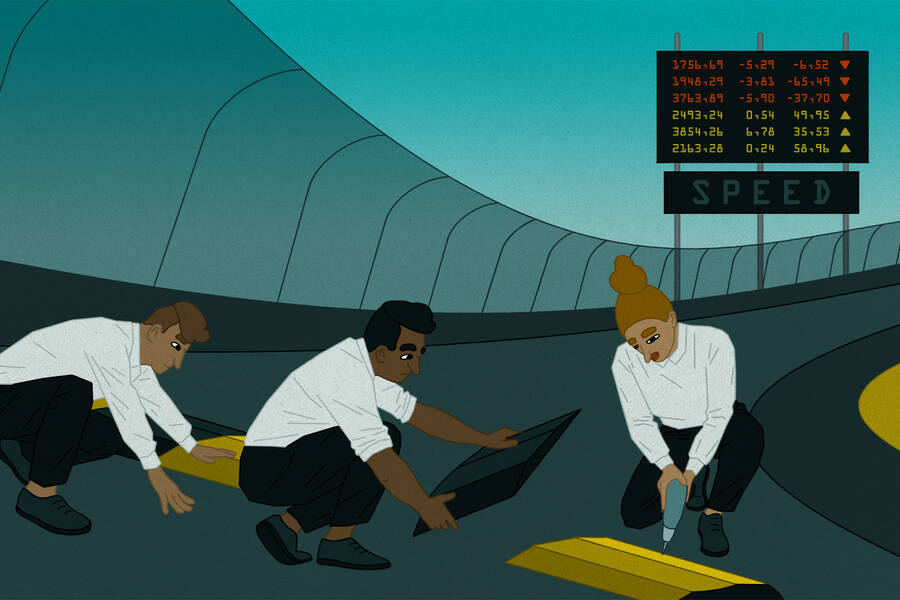
Michael Meier
To sell an asset for the highest price, you generally want to solicit offers from as many buyers as possible. The same goes for purchasing: the more potential sellers you approach, the better the deal you’ll probably get. The benefits of competition are, after all, a cornerstone of economics.
And yet, over-the-counter (OTC) markets tend to work very differently. These are networks for trading securities—like bonds and certain derivatives—that aren’t listed on formalized exchanges, like the New York Stock Exchange. Even for securities that do trade on exchanges, very large trades are often negotiated and traded over the counter.
In OTC markets, traders looking to buy or sell generally contact very few counterparties when seeking to make a deal.
Just why this is remains a persistent mystery in finance. Kellogg’s Joshua Mollner noticed that even the few research papers tackling the confounding pattern head-on didn’t come up with fully satisfying explanations for it.
“They basically say, this is due to technological constraints or search costs,” says Mollner, an associate professor of managerial economics and decision sciences. “Maybe that was true for these markets years ago, but it’s less so today, when we have electronic platforms. Now, with the click of a button, you can ask several different [counterparties] for quotes. And yet, it remains the case that traders don’t ask for many quotes at all.”
So why not? If technological constraints or search costs don’t explain the curious behavior of over-the-counter investors, what does?
Mollner and his coauthor, Markus Baldauf of the University of British Columbia Sauder School of Business, had a hunch. They’d spoken to institutional investors—those overseeing massive coffers like pension funds and endowments—who regularly trade on over-the-counter markets. These insiders suggested that investors like them might be incentivized to hold information about future trades close to the vest because they’ve learned that leaking information to potential counterparties can come back to bite them.
In a new paper, Mollner and Baldauf confirm this suspicion with a mathematical model that reveals why concerns about information leakage lead to sparse trading networks. Their model finds that an investor looking to make a trade receives better prices when she remains as cagey as possible with potential counterparties about the direction of her trade (which she can do by requesting both buy and sell quotes).
What’s more, she’s also better off narrowing her search and speaking to a small number of counterparties. The reason? Even the simple knowledge that an investor—especially a big investor—is looking to make a trade can be a valuable tip from which a counterparty can profit, by “front-running” the market (for example, buying up assets that the counterparty suspects are about to increase in price).
Mollner points out that these findings have policy implications. A current rule from the Commodity Futures Trading Commission (CFTC) mandates that investors in over-the-counter markets contact a minimum number of potential counterparties when looking to trade. However, the researchers’ new findings suggest that such a rule goes against the best interests of investors, who may understandably prefer to minimize such interactions.
“I assume they have in mind these classical economic ideas about how competition is good, and that if we can do something to enhance competition, that will be a good thing,” Mollner says. “But there are some countervailing effects in this particular context. In this setting, unbridled competition is not necessarily going to be best.”
The many ways to profit
Historically, OTC trading happened over the phone. Now, online platforms have made the process much more efficient, but the basic concept remains the same: a client wishing to either buy or sell seeks fulfillment through a counterparty, also called a dealer, who essentially plays matchmaker between buyers and sellers. Dealers briefly hold the assets they are buying and selling; they make their money by buying low and selling high, as well as through fees.
The researchers used a mathematical model to represent the interaction between an investor looking to buy or sell assets on the OTC market and a dealer who might fulfill the trade.
First, the investor must make two key decisions: how many dealers to solicit quotes from (in the model, she can choose between one dealer or two) and what information to provide about her trading direction.
Based on the decisions the investor makes, the dealers then respond with quotes. Quotes are shaped by several factors, including how much competition the trader is facing, the status of the dealer’s own inventory (for example, whether he already holds the asset the investor is looking to buy), and his expectations about the ripple effects an investor’s trade is likely to produce in the market. Mollner calls this third factor the “continuation trading game.”
“In this setting, unbridled competition is not necessarily going to be best.”
—
Joshua Mollner
Crucially, dealers are already anticipating how the continuation trading game will play out as they decide what to quote to an investor hoping to make a trade. Dealers understand up front that even if they “lose” by failing to secure the investor’s business, they can “win” (i.e., profit) in other ways down the line.
“Maybe a dealer who lost the deal with the investor knows that something’s up,” Mollner says. “Maybe he guesses, for example, that the client is buying. This buying would then lead to a price increase on the market. A losing dealer can take advantage of that by front-running—buying early and then turning around and selling late, after prices have gone up.”
This means that, with multiple dealers in the picture, dealers will come to expect other dealers to front-run, raising the trading costs the winning dealer must pay. So dealers bake those anticipated costs into their quotes.
For the investor, the upshot of all of this is inflated pricing.
“The client doesn’t like this front-running,” Mollner says. “What could the client do to try to limit it? Well, one tool that the client has is just to ask for quotes from fewer dealers.”
To better understand the role front-running was playing, the researchers re-ran the model, removing front-running as a factor. They found that the model could no longer explain investors’ observed behavior. In other words, without front-running, there was no reason why investors would contact so few dealers.
A vote for flexibility
“If you take our model literally, what it’s saying is, don’t impose constraints on traders, and trust them to make the decisions that are going to be best for them,” Mollner says. “If we notice that they’re contacting just a small number of potential counterparties—maybe even just one—that does not necessarily mean that they’re making a mistake.”
It’s for this reason that Mollner believes the CFTC rule mandating a minimum number of counterparty contacts needs to go. He and Baldauf also suggest that electronic trading platforms adjust the information they require investors to disclose.
For example, platforms should make it easy for investors to request two-sided quotes (that is, prices to buy and sell) so they can keep their trading directions confidential, Mollner argues. While some trading platforms already allow this type of flexibility, many do not, and the change would make for a healthier over-the-counter market.
More broadly, “it’s important that these platforms allow traders some flexibility and discretion in choosing how many and which potential counterparties to contact,” Mollner says. “Platforms might naively assume that traders always want to contact everybody—but I think that intuition would be wrong.”
Katie Gilbert is a freelance writer in Philadelphia.
Baldauf, Markus, and Joshua Mollner. 2023. “Competition and Information Leakage.” Journal of Political Economy. (Forthcoming.)



